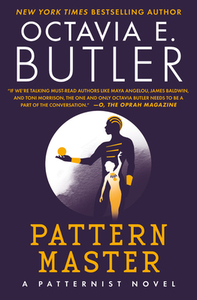Take a photo of a barcode or cover
As a debut novel, this work is impressive, although not perfect. This is also, incidentally, the first of Butler's work that I've read, so I want to emphasize that this book was strong enough to encourage me to return to her. It is, in fact, a real page-turner, a tale which draws the reader in and refuses to let go. And Butler's vivid characterizations, and her seamless exposition of a very different world than that which we live in are handled expertly. She builds a rich culture and, yet, is able to delineate its customs and institutions with admirable clarity; there are very few "what's that all about?" moments for the first-time reader.
Where Butler falls a bit short is her subtext. I'm assuming -- perhaps incorrectly, I'll grant -- that the author is trying to draw parallels to our own culture in order to provide some social commentary, some food for thought, to her audience. This feel like a cautionary tale, but the subject of Butler's warning remains elusive. Why, for example, make her protagonist an aspirant to the pinnacle of what is apparently a borderline-misogynistic patriarchy? Admittedly, the character of Amber provides some relief to this dynamic, representing independent, queer, feminist power (and real power, at that, not simply token power). But much of the story centers the struggle of heterosexual, male characters vying for power, certainly a tired old trope in the realm of sci-fi (and fantasy) at this point. Perhaps you had to be there, in 1976, when this book was first published, in order to see things differently. It may very well have been more disruptive in its day, but from the perspective of 2022, it feels a bit antiquated. One can easily imagine Amber vanquishing both Coransee and Teray and taking over as Patternmaster, but perhaps Butler was trying to illustrate a contrast between brute force/male pride (i.e., arrogance) and a more balanced wisdom exemplified by Amber?
The only other complaint I have is that this novel is, arguably, a little too slight. It is a quick, short read, and some of that is the result of Butler's fluid, organic prose. But she might have benefited from, for example, providing a little more back story at the opening, providing more of a denouement, and fleshing out some of the scenes in between which fly by, perhaps, just a bit too quickly. In other words, in this writer's opinion, she has yet to master the ebb and flow of perfect pacing.
Regardless of these quibbles, Butler has here created an intriguing and entertaining world which is, nevertheless, thought-provoking at every turn. No mean feat for a first-time novelist.
Where Butler falls a bit short is her subtext. I'm assuming -- perhaps incorrectly, I'll grant -- that the author is trying to draw parallels to our own culture in order to provide some social commentary, some food for thought, to her audience. This feel like a cautionary tale, but the subject of Butler's warning remains elusive. Why, for example, make her protagonist an aspirant to the pinnacle of what is apparently a borderline-misogynistic patriarchy? Admittedly, the character of Amber provides some relief to this dynamic, representing independent, queer, feminist power (and real power, at that, not simply token power). But much of the story centers the struggle of heterosexual, male characters vying for power, certainly a tired old trope in the realm of sci-fi (and fantasy) at this point. Perhaps you had to be there, in 1976, when this book was first published, in order to see things differently. It may very well have been more disruptive in its day, but from the perspective of 2022, it feels a bit antiquated. One can easily imagine Amber vanquishing both Coransee and Teray and taking over as Patternmaster, but perhaps Butler was trying to illustrate a contrast between brute force/male pride (i.e., arrogance) and a more balanced wisdom exemplified by Amber?
The only other complaint I have is that this novel is, arguably, a little too slight. It is a quick, short read, and some of that is the result of Butler's fluid, organic prose. But she might have benefited from, for example, providing a little more back story at the opening, providing more of a denouement, and fleshing out some of the scenes in between which fly by, perhaps, just a bit too quickly. In other words, in this writer's opinion, she has yet to master the ebb and flow of perfect pacing.
Regardless of these quibbles, Butler has here created an intriguing and entertaining world which is, nevertheless, thought-provoking at every turn. No mean feat for a first-time novelist.
I liked this last book in the Patternist series, especially the bisexual badass Amber who is the main character's smarter, more worldly sidekick, though overall it wasn't my favorite. It wove in themes/issues brought up in the earlier books in the series, but not with the level of nuance I'd expect of Butler. Still, I recommend the entire series!
The territory of telepathic Patternists is under constant attack by animalic, virulent Clayarks--which makes the succession of a new Pattermaster urgent. Patternmaster is surprisingly small, not just short but localized in scope despite the speculative concepts of the larger world. It's a compelling starting point for a series that backtracks to explore those speculative elements, but if they're already familiar then it's an underwhelming finale. Butler's prose is particularly workmanlike, but as always she excels in conveying the claustrophobic pressure of a flawed social system. Most surprising is the appearance of bisexual female character, who defies Butler's frustrating tendency towards heteronormativity and, outspoken and feminist, also provides this flawless exchange:
My opinion of this series entire remains unchanged: it is best read in publication order, and to read it in internal chronological order makes for an uneven, frustrating experience. I wish I could go back and correct my mistake; having made it, I'm still glad to have read the series, but this novel in particular left little impression.
"I don't think you've done anything to her. Joachim has, and certainly Coransee has. But you're only about to."
"By leaving her--or by taking her?"
"By deciding for her."
"I don't want to get her killed."
Amber shrugged. "If it were me, I'd want to make up my own mind."
My opinion of this series entire remains unchanged: it is best read in publication order, and to read it in internal chronological order makes for an uneven, frustrating experience. I wish I could go back and correct my mistake; having made it, I'm still glad to have read the series, but this novel in particular left little impression.
Octavia Butler has her themes set in place in this first book, and over the course of the series, she returns to them again and again. Hegel did it first, though, in the master-slave dialectic. The master has power but cannot compel or perhaps feel love, or know himself. The slave has true self-consciousness and can exert what a later writer would call [b:Powers of the Weak|736213|Powers of the Weak|Elizabeth Janeway|https://s.gr-assets.com/assets/nophoto/book/50x75-a91bf249278a81aabab721ef782c4a74.png|722395]. A little of this goes a long way.
adventurous
challenging
mysterious
reflective
medium-paced
My ranking for this book is probably closer to a 4 as a stand-alone novel, but within the actual Patternist series I would give this a 3. I think that as a stand alone novel (as it was originally written) it would have been much stronger, as it’s strength is in the world it creates and the mystique of the Pattern and the strangeness of the Clayarks. However, as the final book following a series of three prequels, the rules of the Pattern and the origin of the Clayarks have been made known to the reader thoroughly, robbing this book of what was surely its unique quality at the time of publication. Perhaps this is why I ranked Wild Seed, the first chronologically and the first I read, the highest, as it was showing me the world of the pattern for the very first time.
As for the book itself, I think it succeeds in most of what it attempts, and the few questions it raises that it does not respond to immediately are addressed throughly in a prequel. I enjoyed the relationship between Amber and Teray (though it was admittedly a bit tame by Butler’s standards…) I definitely got some echoes of Anyanwu/Emma resisting Doro through Amber’s defiance of Coransee.
As I write this I realize that most of my critiques of the book can be explained by it being the first written, obviously it isn’t going to be the grand climactic conclusion of four books when it was just the source material for that very same series! So perhaps I’m being a bit harsh, but this definitely grabbed me the least among the Patternist series.
As for the book itself, I think it succeeds in most of what it attempts, and the few questions it raises that it does not respond to immediately are addressed throughly in a prequel. I enjoyed the relationship between Amber and Teray (though it was admittedly a bit tame by Butler’s standards…) I definitely got some echoes of Anyanwu/Emma resisting Doro through Amber’s defiance of Coransee.
As I write this I realize that most of my critiques of the book can be explained by it being the first written, obviously it isn’t going to be the grand climactic conclusion of four books when it was just the source material for that very same series! So perhaps I’m being a bit harsh, but this definitely grabbed me the least among the Patternist series.
tense
medium-paced
Plot or Character Driven:
Plot
Strong character development:
No
Loveable characters:
Yes
Diverse cast of characters:
Yes
Flaws of characters a main focus:
Complicated
First off, I want to point out that I read these in order of publication, not chronological order. I'm not really sure what is the better way to go. It was pretty interesting getting the story bits at a time, and each book's focus was on something mentioned in previous books, so you could sort of place what you were reading about in the grand scheme.
Patternmaster shows the far, far future, where a society has been created that is completely unlike our current society. People with psychic abilities rule and those without are pretty much just bred to be slaves. There are complex rules in place. They also live in fear of what seems to be a subhuman race called the Clayarks, who can transmit their "mutation" to other people.
To me, the conflict between Teray and Coransee was less interesting than the worldbuilding itself. That's probably a good thing, since the characters themselves are a one-off (being that this is the "final" book in the series, chronologically).
Anyway, it's quite different in tone and content to other sci-fi I've read.
Patternmaster shows the far, far future, where a society has been created that is completely unlike our current society. People with psychic abilities rule and those without are pretty much just bred to be slaves. There are complex rules in place. They also live in fear of what seems to be a subhuman race called the Clayarks, who can transmit their "mutation" to other people.
To me, the conflict between Teray and Coransee was less interesting than the worldbuilding itself. That's probably a good thing, since the characters themselves are a one-off (being that this is the "final" book in the series, chronologically).
Anyway, it's quite different in tone and content to other sci-fi I've read.
fast-paced
My girl writes a good ass story. A lot of what she writes is about freedom and free will and beating ppl who are more powerful than you and having to be clever and shit.
adventurous
challenging
dark
medium-paced
Plot or Character Driven:
A mix
Strong character development:
Complicated
Loveable characters:
Complicated
Diverse cast of characters:
Complicated
Flaws of characters a main focus:
Yes




